English CBSE Class 10 NCERT First Flight Chapter 1 A Letter to God Free Solution of Extra Questions and Answers – Extract Based Questions Sholart Answer Questions Long Answer Questions and Value Based Questions
A LETTER TO GOD
(Extra Questions)
Extract Based Questions


1. Why was Lencho looking towards north-east?
2. Why earth needed a downpour?
3. Which word in the extract mean ‘to know closely’?
4. Write antonym of ‘morning’.


1. Why did Lencho become angry?
2. With whom did Lencho have confidence?
3. Which word in the extract mean ‘minimum’?
4. What did Lench do next?


1. How much money Lencho had asked for?
2. Why Lencho needed money?
3. Which word in the extract mean ‘remaining’?
4. What did Lencho think about employees of post office?


1. Who spoke these lines?
2. To whom did the speaker said these lines?
3. What is the currency of the area where the speaker lived?
4. How many houses the valley had?


1. Who wrote these lines?
2. To whom are above lines addressed to?
3. Why speaker needs to sow his field again?
4. Which crop the speaker wanted to sow.?


1. Who is referred as ‘he’ in above extract?
2. Which word in the extract means a large group?
4. From which direction the storm had come?


1.Who is speaker of above extract?
2. Who is referred as ‘the man’ in above extract?
3. What request was made by ‘the man’ in his letter?
4. Was the request of ‘the man’ completely accepted by God?
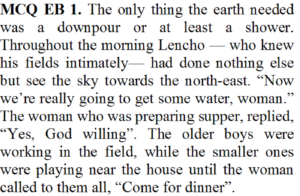

(i) The earth needed
(a) a down pour
(b) a shower
(c) either of (a) or (b)
(d) both (a) and (b)
(ii) Lencho was looking toward which of the following directions
(a) North
(b) East
(c) North and East
(d) North- East
(iii) “Now we’re really going to get some water, woman.” Form where was water expected to come?
(a) river
(b) hill
(c) ground
(d) sky
(iv) Who continued to work in the field till woman called them?
(a) younger boys
(b) older boys
(c) Lencho
(d) None of the above
(v) Based on the extract please classify following as fact and opinion
- Lencho was a rich farmer, I believe so.
- Lencho knew the needs of his fields.
- The woman was a hopeful person.
- Younger boys did not go far from their house to play
(a) F -1,2 and O -3,4
(b) F- 1,4 and O- 2,3
(c) F – 3,4 and O – 1,2
(d) F – 1,3 and O – 2,4
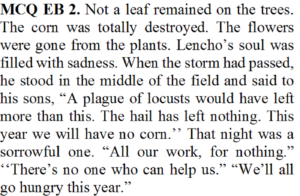

(i) Which of the following damage was not caused by the hail
(a) all leaves fell down
(b) all corn was destroyed
(c) all flower were gone from the plant
(d) all rivers were overflowing
(ii) When did Lencho go to his fields
(a) during the rain
(b) after the rain
(c) during the storm
(d) after the storm
(iii) An expression ‘Not a leaf remained on the trees.’ Has been used in the extract. Which of the following is not the correct use of similar expression?
(a) not a book remained in the library.
(b) not a rupee remained in purse
(c) not a health remained in my body
(d) not a spectator remained in the stadium
(iv) Based on the extract please classify following as fact and opinion
- a plague of locusts would have left more than this
- all our work, for nothing
- the hail has left nothing
- there’s no one who can help us
(a) F -2,3 and O- 1,4
(b) F – 1,2 and O – 3,4
(c) F – 1,3 and O – 2,4
(d) F – 1.4 and O -2,3
(v) Which of the following word represents a group
(a) leaf
(b) plague
(c) soul
(d) storm
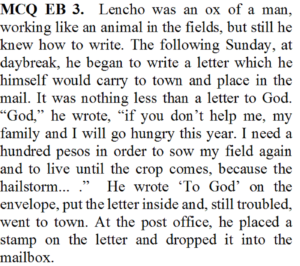

(i) As per the abstract, which of the following is correct?
(a) Lencho worked hardly in his fields
(b) Lencho worked hard in his fields
(c) Lencho did not know how to write
(d) Lencho worked during small hours of day
(ii) Lencho went to the town on
(a) Friday
(b) Saturday
(c) Sunday
(d) Monday
(iii) Lencho needed money due to which of the following reasons
(a) to sow his field again
(b) to live until the next crop
(c) either of (a) or (b)
(d) both (a) and (b)
(iv) Based on the extract please classify following into fact and opinion.
- I think Lencho himself wrote the letter.
- There was no need for him to carry the letter himself
- Lencho needed hundred pesos
- I wonder why Lencho did not write an open letter to God
(a) F – 1,2 and O -3,4
(b) F – 1,3 and O- 2,4
(c) F – 2,3 and O -1,4
(d) F – 2,4 and O – 1,3
(v) What is the correct sequence of following activities completed by Lencho
- wrote letter
- dropped in the mail box
- wrote address on the envelop
- went to the town
(a) 1,2,3,4
(b) 1,3,4.2
(b) 4,3,2
(c) 4,2,1,3
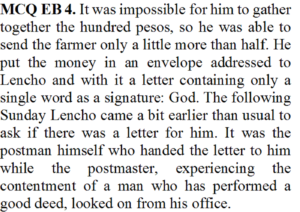

(i) On what day the letter was received by Lencho?
(a) Friday
(b) Saturday
(c) Sunday
(d) Monday
(ii) What was written in the letter?
(a) Seventy only
(b) For you only
(c) Bless you
(d) God
(iii) Who gave the letter to Lencho?
(a) Postman
(b) Postmaster
(c) God
(d) Lencho himself collected it
(iv) A phrase ‘only a little more than half’ has been used in the extract. Which of the following is not the correct use of ‘a little more than’?
(a) only a little more than necessary
(b) only a little more than wastage
(c) only a little more than one third
(d) only a little more than twenty
(v) Based on the extract please calssify following as fact and opinion
- Had the postmaster tired a bit more, he would have gathered hundred pesos.
- Lencho reached post office on Sunday
- Postman was eagerly waiting for Lencho thus welcomed him
- Postmaster was watching Lencho from his office
(a) F – 1,2 and O – 3,4
(b) F – 3,4 and O – 1,2
(c) F – 1,4 and O – 2,3
(d) F – 1,3 and O- 2,4
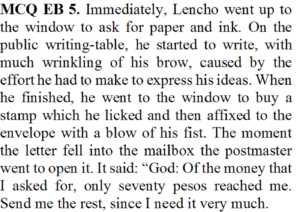

(i) What thing did Lencho ask at the window of the post office?
(a) paper
(b) ink
(c) either (a) or (b)
(d) both (a) and (b)
(ii) At the writing table, following activities and emotions could be observed
(a) Lencho was writing
(b) Lencho was make lot of efforts to write
(c) Eybrows of Lencho were frowned
(d) All the above
(iii) What activities were completed by Lencho after writing the letter?
(a) bought a stamp
(b) licked the stamp
(c) affixed the stamp
(d) all the above
(iv) Who had picked up the letter from the mailbox?
(a) postman
(b) postmaster
(c) Lencho
(d) none of the above
(v) The money asked by Lencho was
(a) less than he received
(b) more than he received
(c) equal to what he received
(d) all the above
Short Answer Questions (30-40 words)


Answer: Lencho was angry because the letter had 70 pesos against his request of 100 pesos. He wrote another letter to God requesting him to send remaining money. He advised God not to send money through mail because post office people were crooks.


Answer: The post master was kind and generous person. He appears to be a god fearing person. He was a creative person and had a ‘can do attitude’. Owing to above qualities he could mobilse 70 pesos for Lencho.


Answer: Owing to hailstorm, crop of their field was completely destroyed. They would have to remain hungry for the year. Hence they were worried.
They had complete faith in God.
![]()
![]()
Answer: Hailstorm lasted for about an hour. The complete field had become white as if salt had been spread on it. All the leaves of trees had fallen off. The corn was totally destroyed and all the flowers had fallen off the plants.
Long Answer questions (120-150 words)


Answer: World is full of grief and the same world is full of happiness. Sorrow and delight are two sides of same coin called life.
Some people keep staring at sorrow for such a long time that they neglect happiness. Lencho represents such people. He was in need of 100 pesos. He received 70 pesos which is a big part of requirement. He should have been grateful to God. But he remained unhappy.
Happiness is made up of small events that occur by design or chance. When one appreciates such little events one gets motivated on the path of karma. As written in Gita, karma eventually leads towards satisfaction and happiness.
On receipt of 70 pesos, I would have thanked God and immediately started sowing my field. Probably God wanted to give balance 30 pesos through better yield or higher price of crop.


Answer: He had faith in God and always wanted to support faith of other human beings. He was touched by the address written on the envelope. He thought very high of a person who had faith in God. He did not want to shake faith of Lencho. So he decided to open the letter.
Postmaster was very kind hearted person. After reading the content of the letter he understood that Lencho was really in trouble. So he decided to help him by contributing some money to Lencho.
Postmaster was creative and had a ‘can do’ attitude. He realised that he alone could not contribute much money. So he mobilized his colleagues and friends to contribute toward the good cause. He collected 70 pesos and sent this money to Lencho.
Postmaster did not believe in taking credit for helping others. He wanted to remain anonymous because he thought it to be a service to humanity.
I think such people still exist in society though their numbers are very small.


Answer: I would have certainly felt very bad after reading the last line of the second letter. The expectation of getting 100 pesos was alright but calling my colleagues as ‘bunch of crooks’ was certainly insulting.
Immediately I would have realised the feelings of Lencho. He was certainly in need of 100 pesos and had complete faith in God. This would have pacified myself a lot.
I would have replied to his letter by signing God. I would state that he may spend 40 peso in sowing his filed again. Remaining 30 pesos he should utilse in supporting his family till new crop comes. I would have advised him to work hard in his field. I would have assured him that if he works hard in the field, the crop would be much better this time.
This way I would have addressed his concern and motivated him towards his karma.


Answer: After the hailstorm had destroyed his crop, the full family was under distress. The yearlong hunger was staring at them. There was nobody nearby to whom they could approach for help. They had faith only in God. They were sure that He sees everything and helps everyone.
So profound was their faith and the need that Lencho decided to write a letter to God. He wanted to communicate his need to God. The whole family must have been praying for the help.
Lencho was literate person. Inspite of that, he decided to write a letter to God. He must have pretty well known that a physical thing never reaches God. But owing to his miserable condition he had become so innocent that he wrote a letter to God.
Thus we can conclude that letter represents faith as well as innocence of Lencho.
****
DUST OF SNOW
(Extra questions)
Short Answer Questions (30-40 words)


Answer: Poet was in a sad mood. He was walking by a hemlock tree. A crow shook snow off the tree which fell on the poet. His mood changed from sadness to happiness. So poet sees nature as a means of happiness.


Answer: Poet wants to say that many times we are not able to control situation in life hence we become sad. Even in sad situations we can find little things in nature that can make us happy. We should look for those moments and cherish these.


Answer: Poet was in a bad mood. He thought that his full day would be ruined. He was feeling very depressed.
After snow fell on him, his mood changed and he thought that his remaining day would be full of hope and happiness.


Answer: Initially the poet was in a sad mood. Poet uses crow and hemlock to express his mood. Later dust of snow falls on the poet and his mood changes.
Poet wants to give a message that even in grim situations we can find some little things to make us happy.
Long Answer Questions (120-150 words)


Answer: Attitude is the way we behave and respond to daily activities of life. Positive attitude is a state of always being optimistic and continue to do best even in adverse situation. It is exactly opposite of pessimistic attitude that sees wrong in everything and visualizes only failures.
Being positive in life is a virtue that see us through difficult times. Successful people see circumstances as a challenge to overcome not a punishment to suffer.
When we stop reacting and start responding, good thoughts start coming to our mind. We become a master of ourselves and success follows.
In the poem, the poet was initially sad for a reason not known to us. But by an otherwise unimportant event of dust of snow falling on him, he becomes happy. He looked at the event with a positive attitude and his day became better.
Pranjal Patil, the first visually impaired IAS officer of India is an example who has maintained positive attitude throughout her life.
We all should maintain positivity within and around us to remain happy and become successful.
****
FIRE AND ICE
(Extra questions)
Short Answer Questions (30-40 words)


Answer: In the poem fire symbolizes desire and ice symbolizes hatred. Each of these tribute is capable of destroying the world.


Answer: The poet wants to convey that uncontrolled desire and hatred have the potential of destroying the world. Poet wants us to control our materialistic nature. He wants us to respect every other human being and environment.


Answer: The poet is aware about fire of passion and desire for materialistic things. He thinks that uncontrolled desires can lead us to destruction of world. He supports the thought that one day the world may get destroyed due to excessive heat.


Answer: As per one of the two thoughts prevailing, world will become so cold that no living being would survive. Poet has used ice symbolically for insensitivity and hatred towards each other.
Thus ice is more than sufficient to end the world.
Long Answer questions (120-150 words)


Answer: Initially the poet narrates two thought that can end this world. One school of thought says that someday the world would become so hot that everything on the world would burn. Another thought is that the world would become so cold that no living could survive on the world.
Later poet equates fire to uncontrolled desire, passion and materialistic attitude of human beings. Their desire to extract more from nature has become highly destructive. Poet equated ice to the insensitive attitude of human beings and hatred towards each other. These evils can bring the world to an end.
We need to control our needs. We should keep paying back to nature more than we take. We need to foster brotherhood and affection in the world.
This way we can make this world a better place to live.


0 Comments